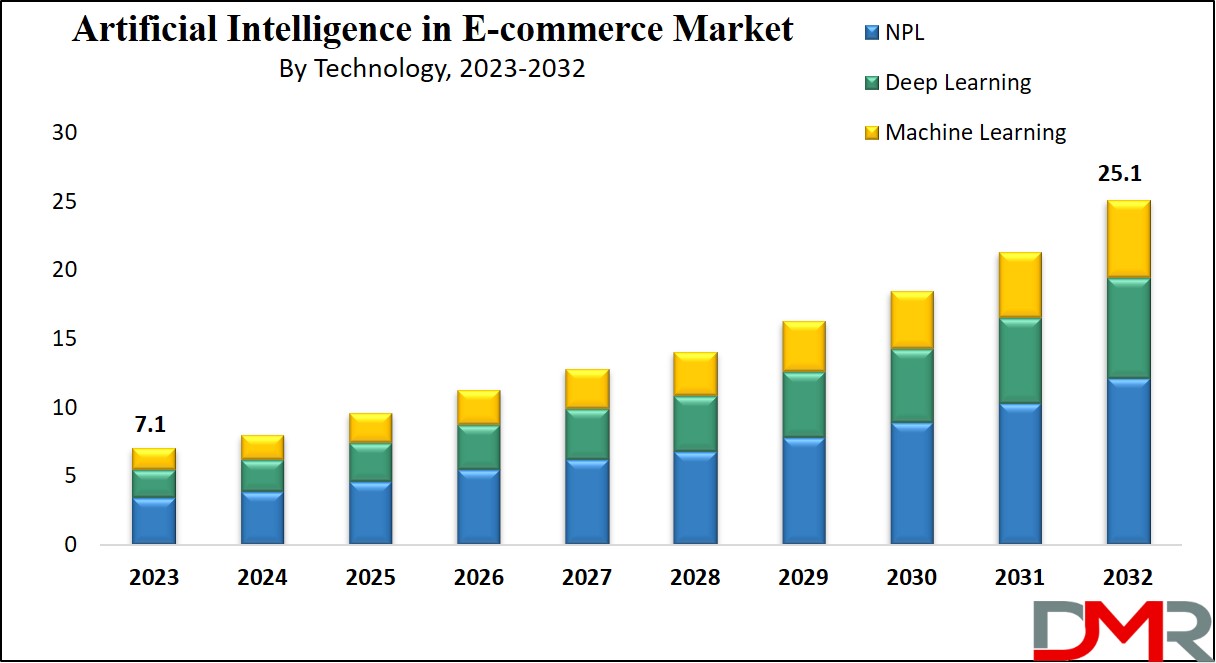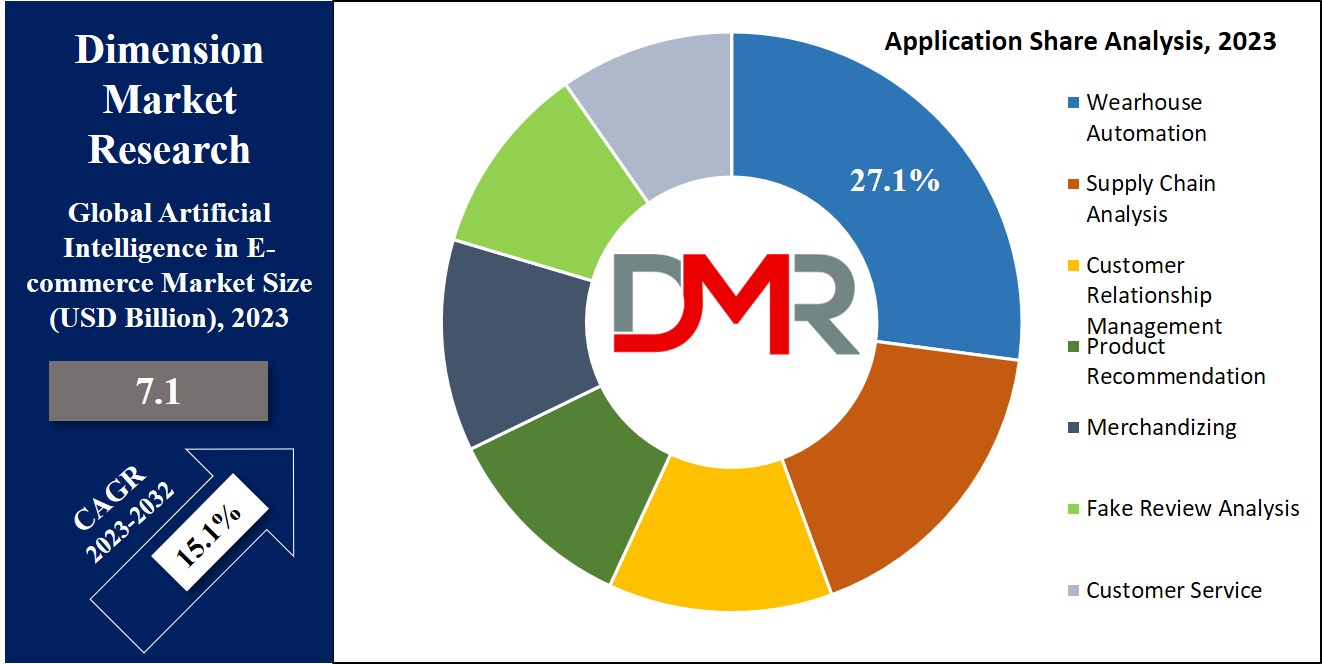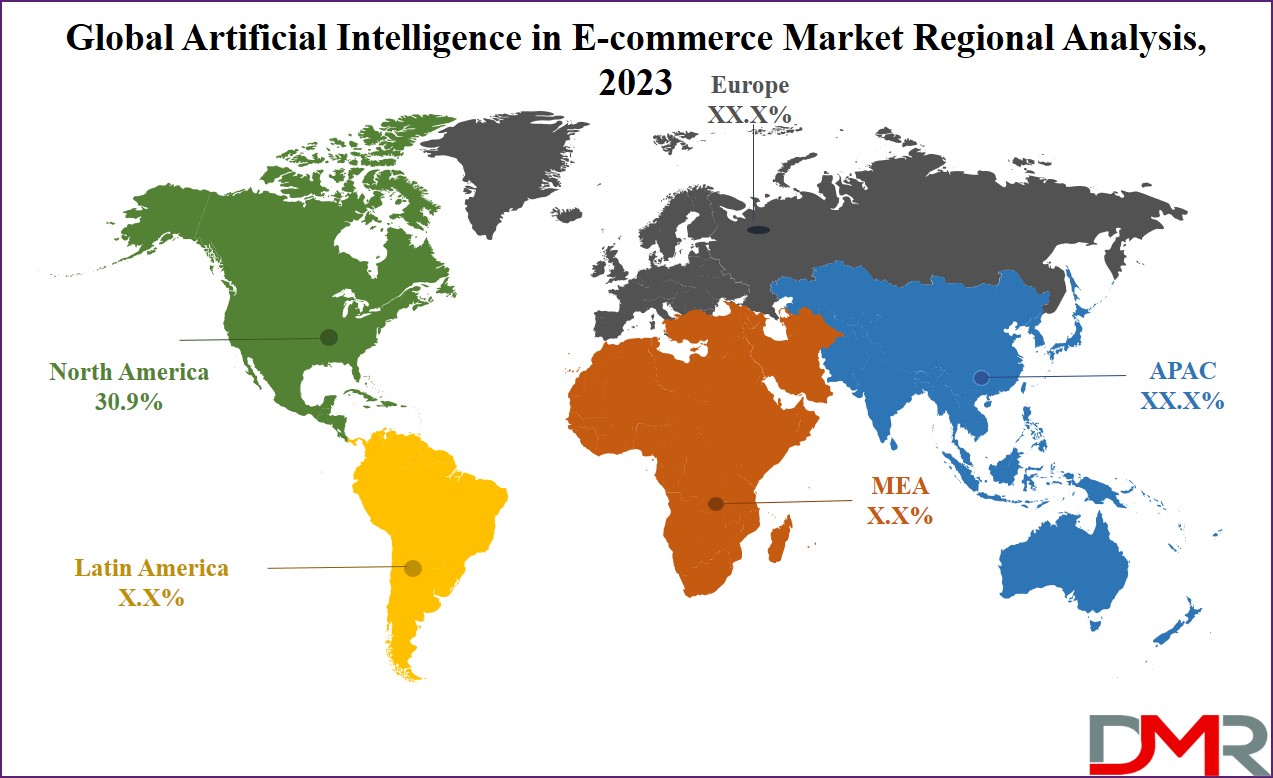Market Overview
The Global Artificial Intelligence in E-commerce Market is expected to reach a value of USD 7.1 billion in 2023, and it is further anticipated to reach a market value of USD 25.1 billion by 2032 at a CAGR of 15.1%. The market has seen a significant increase in the recent past and is predicted to grow significantly during the forecasted period as well.
AI plays a crucial role in e-commerce marketing by allowing businesses to gain insights into customer behavior & emerging trends, encouraging the creation of highly customized advertising, marketing initiatives, & promotions. Marketers give more importance to generative AI tools to efficiently scale their content production & ensure message alignment with their target audience. Additionally, AI supports retargeting potential customers through an omnichannel approach, pleasing them to make purchases of products and services.

AI solutions in e-commerce are in high demand due to consumer expectations of more tailored offerings and personalized experiences. AI allows e-commerce businesses to use personalized marketing strategies, refine product recommendations and offer better post-purchase customer service - not to mention using predictive analytics and automation for improved decision making and sales performance.
Emerging opportunities in the market include using generative AI for content production, product descriptions and digital advertising purposes as well as virtual shopping experiences. Retailers are exploring AI's use in virtual shopping environments. Data privacy issues and integration complexities remain challenges that businesses must face to fully capitalize on AI's potential.
Artificial Intelligence (AI) in e-commerce is growing quickly; global retail revenue driven by
AI reached USD 7 billion by 2023. AI adoption across e-commerce is revolutionizing customer service with over 60% of businesses using
chatbots for engagement enhancement; 70% of retailers implement personalized product recommendations resulting in up to
25% increases in sales.
AI-powered solutions also improve operations. Around 40% of inventory management is now optimized with AI, helping reduce stockouts by 30%. Also, in marketing AI ads have shown a 20% improvement in ROI for e-commerce companies while supply chain operations using AI have reduced operating costs by 15%, showing its growing use as an enabler of greater industry efficiency.
Key Takeaways
- Market Size & Growth: The Global Artificial Intelligence in E-commerce Market was valued at USD 7.1 billion in 2023 and is projected to reach USD 25.1 billion by 2032, growing at a CAGR of 15.1%, driven by increasing personalization and automation in online retail.
- Leading Technologies: Natural Language Processing (NLP) held the largest share in 2023, enabling intelligent product categorization, search customization, and sentiment analysis. Other key technologies such as deep learning and machine learning are also accelerating personalized marketing, recommendation engines, and predictive analytics.
- Applications Driving Growth: Major applications include warehouse automation (supported by IoT sensors and smart robots), supply chain analysis, product recommendation, and customer relationship management. AI-powered personalization and automated marketing strategies have significantly boosted customer engagement and conversion rates.
- Deployment Trends: Cloud-based platforms dominate the market, accounting for the largest share in 2023, owing to their scalability, real-time data analytics, and inventory forecasting capabilities. On-premise deployment remains relevant but is less favored due to limited flexibility and higher operational costs.
- Regional Insights: North America leads with 30.9% revenue share, driven by heavy AI adoption in retail, logistics, and government sectors. Asia-Pacific is set for the fastest growth due to rapid digitalization, expanding e-commerce platforms, and strong investments in AI solutions across China, India, and Southeast Asia.
Use Cases
- Personalized Shopping Experiences: AI enables tailored product recommendations, dynamic pricing, and targeted promotions, leading to higher customer satisfaction and up to 25% sales uplift for retailers.
- Warehouse & Inventory Management: AI-powered automation and IoT sensors optimize stock levels, reduce stockouts by 30%, and improve warehouse efficiency through predictive demand forecasting.
- Customer Service & Engagement: Over 60% of e-commerce firms deploy AI chatbots and virtual assistants to handle inquiries, provide real-time support, and improve post-purchase experiences.
- Fraud & Fake Review Detection: AI-driven algorithms analyze user behavior and text patterns to identify fraudulent transactions and fake reviews, enhancing trust and credibility for online platforms.
- Supply Chain Optimization: AI supports route planning, demand prediction, and logistics automation, reducing supply chain operating costs by up to 15% while ensuring faster deliveries.
Market Dynamic
Artificial intelligence is driving a major revolution in online shopping, fundamentally evolving the market by predicting buying trends based on customer purchase patterns & timing. One essential area where AI's predictive analytics are making a big impact is inventory management in e-commerce. Given the limitations in storage capacity & budget constraints, efficient inventory prioritization is essential. Keeping stock up-to-date, well-organized, and ordered in advance based on projected customer needs is crucial.
The extent of product and service personalization plays a major role in customer retention. An effective strategy to enhance client loyalty includes delivering personalized marketing content & customized shopping experiences to target audiences. Further AI technologies, mainly deep learning & statistical modeling, empower e-commerce retailers to analyze large data, including consumer behavior & demographics.
With these insights, retailers can craft customized advertisements, send targeted emails, recommend products, & set pricing customized specifically to individual customers. Intelligent personalization allows online businesses to establish stronger emotional connections with their customers, ultimately creating higher levels of customer loyalty and retention thus driving the growth of the market.
Research Scope and Analysis
By Technology
In terms of technology, the segment that dominates the market in 2023 is
natural language processing or NLP, which is further anticipated to play a major role in driving the growth of global artificial intelligence in the e-commerce market, which is mainly driven by NLP's capacity to improve user search customization. E-commerce retailers are turning to NLP to strongly categorize products & engage potential customers by providing personalized product or service recommendations. Also, NLP has been sought after for its affordability in solutions, its ability to analyze sentiments, & its accomplishing of intelligent search functionality.
Further, NLP's impact on artificial intelligence in the e-commerce market is significant, as it not only enhances user experience but also provides businesses with valuable tools for product categorization, recommendation systems, & sentiment analysis.
By Application
In terms of applications within the Global Artificial Intelligence in E-commerce Market, there is a significant growth anticipated in warehouse automation throughout the forecasted period, which can be said owing to the growing adoption of IoT sensors for automating alert systems & inventory tracking. Further current trends in hyper-automation are anticipated to optimize warehousing operations through the integration of AI-powered smart robots, which can improve productivity & efficiency for e-commerce businesses by facilitating seamless warehouse management.

By Deployment
In terms of deployment, the cloud-based platform holds the largest share of the global market in 2023, mainly due to its scalability & efficient inventory management capabilities. Moreover, the cloud offers advanced features like live data & analytics for accurate inventory forecasting, empowering e-commerce businesses to provide customized experiences & adapt quickly. Further, stakeholders anticipate that cloud computing will play a major role in improving the e-commerce sector by providing scalable architecture & insights into traffic, demand fluctuations, and seasonal growths.
The Global Artificial Intelligence in E-commerce Market Report is segmented based on the following:
By Technology
By Application
- Warehouse Automation
- Supply Chain Analysis
- Customer Relationship Management
- Product Recommendation
- Merchandizing
- Fake Review Analysis
- Customer Service
By Deployment
Regional Analysis
North America emerges as the dominant player in the market with a major share of 30.9% of the total revenue in the global AI in e-commerce market & is anticipated to maintain its leadership throughout the forecast period, mainly driven by large investments in AI solutions within government & public sectors. Moreover, the adoption of AI technology for industrial machinery automation is anticipated to further drive the growth of Artificial Intelligence in the E-Commerce Market in the coming years as well.

Further, Asia Pacific is also anticipated to witness significant growth in the coming future as well, owing to both economic & technological advancements in the region. These developments are expected to give strong assistance for the continuous expansion of artificial intelligence solutions during the forecasted period.
By Region
North America
Europe
- Germany
- The U.K.
- France
- Italy
- Russia
- Spain
- Benelux
- Nordic
- Rest of Europe
Asia-Pacific
- China
- Japan
- South Korea
- India
- ANZ
- ASEAN
- Rest of Asia-Pacific
Latin America
- Brazil
- Mexico
- Argentina
- Colombia
- Rest of Latin America
Middle East & Africa
- Saudi Arabia
- UAE
- South Africa
- Israel
- Egypt
- Rest of MEA
Competitive Landscape
The competitive landscape of Global Artificial Intelligence in E-commerce Market experiences intense rivalry among key players, including tech giants like Amazon, Microsoft, IBM, and more along with various startups specializing in AI-driven e-commerce solutions. These companies are involved in developing innovative AI tools that can personalize shopping experiences, optimize supply chains, & enhance customer service. In addition, market leaders are also expanding their reach through strategic acquisitions & partnerships, further intensifying the competition in this dynamic sector, while smaller players aim at niche markets & specialized AI applications to increase their presence and market share.
For instance, In April 2022, Amazon announced its plans to allocate an investment of
USD 1 billion toward startups & firms working on advancements in supply chain management, logistics, safety, &warehouse management technologies. Additionally, the company plans to launch the Amazon Industrial Innovation Fund, focused on expanding e-commerce delivery efficiency & enhancing the overall work environment for employees in logistics & warehousing operations.
Some of the prominent players in the Global Artificial Intelligence in E-commerce Market are:
- Oracle Corp
- Google LLC
- Apple Inc
- Amazon Web Services
- SAP SE
- Microsoft Corp
- Intel Corp
- NVIDIA
- IBM Corp
- Siemens
- Other Key Players
Recent Developments
- September 2025 – Amazon launched Lens Live, an AI-powered visual shopping feature that lets users point their iPhone camera at any real-world object—like shoes or gadgets—and instantly receive similar product suggestions, prices, and reviews. It integrates seamlessly with Amazon's AI assistant, Rufus, enabling real-time purchasing.
- July 2025 – fal, an AI infrastructure company, raised $125 million in Series C funding, reaching a valuation of $1.5 billion. The round was led by Meritech, with participation from Salesforce Ventures, Shopify Ventures, and Google's AI Futures Fund.
- March 2025 – Binny Bansal (Flipkart cofounder) backed ShopOS with a $20 million investment. ShopOS is building an AI-driven “operating system” aimed at scaling e-commerce operations for global online brands.
- Last week (September 2025) – AI agents are increasingly taking over the e-commerce interface, with giants like OpenAI, Google, Microsoft, and Perplexity launching autonomous shopping agents that can search products and complete purchases without user intervention. This shift is prompting brands to revamp their SEO strategies to stay visible in AI-mediated marketplaces.
Report Details
| Report Characteristics |
| Market Size (2023) |
USD 7.1 Bn |
| Forecast Value (2032) |
USD 25.1 Bn |
| CAGR (2023-2032) |
15.1% |
| Historical Data |
2018 – 2023 |
| Forecast Data |
2024 – 2033 |
| Base Year |
2023 |
| Estimate Year |
2024 |
| Report Coverage |
Market Revenue Estimation, Market Dynamics, Competitive Landscape, Growth Factors and etc. |
| Segments Covered |
By Technology (NPL, Deep Learning and Machine Learning), By Application (Wearhouse Automation, Supply Chain Analysis, Customer Relationship Management, Product Recommendation, Merchandizing, Fake Review Analysis and Customer Service), By Deployment (Cloud and On-Premise) |
| Regional Coverage |
North America – The US and Canada; Europe – Germany, The UK, France, Russia, Spain, Italy, Benelux, Nordic, & Rest of Europe; Asia- Pacific– China, Japan, South Korea, India, ANZ, ASEAN, Rest of APAC; Latin America – Brazil, Mexico, Argentina, Colombia, Rest of Latin America; Middle East & Africa – Saudi Arabia, UAE, South Africa, Turkey, Egypt, Israel, & Rest of MEA |
| Prominent Players |
Oracle Corp, Google LLC, Apple Inc, Amazon Web Services, SAP SE, Microsoft Corp, Intel Corp, NVIDIA, IBM Corp, Siemens and Other Key Players |
| Purchase Options |
We have three licenses to opt for: Single User License (Limited to 1 user), Multi-User License (Up to 5 Users), and Corporate Use License (Unlimited User) along with free report customization equivalent to 0 analyst working days, 3 analysts working days and 5 analysts working days respectively. |
Frequently Asked Questions
The Global Artificial Intelligence in E-commerce Market is estimated to reach USD 7.1 billion in 2023, which is further expected to reach USD 25.1 billion by 2032.
North America dominates the Global Artificial Intelligence in E-commerce Market with a share of 30.9% in 2023.
Some of the major key players in the Global Artificial Intelligence in E-commerce Market are Google, IBM, Amazon, and many others.
The market is growing at a CAGR of 15.1 percent over the forecasted period.